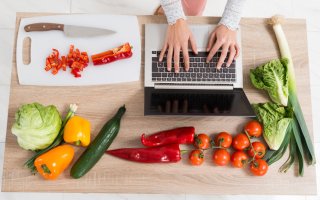6 functions to make purchasing easier and cheaper for the food service sector
Purchasing is a major element of hotel and restaurant management, but there are a lot of other things to consider before actually placing an order. Millum provides you with a purchasing system, along with a whole set of other tools that you need to run an efficient catering kitchen.

Calculate the carbon footprint of the food with the CO2 calculator
Sustainability has been a major issue in the food service sector for a long time now. That is why most hotels and restaurants have now set their own sustainability targets to work towards. If they are to attain these, it is essential to be aware of their own climate footprint.
When Millum realised how important it was for businesses in the industry to gain an overview of their own climate footprint, it developed a CO2 calculator using data from RISE, which presents the carbon footprint of a menu, per portion and at line item level. The scale it uses has four levels - green, yellow, orange and red, displayed as a leaf icon - where green is the best and red is the worst for the environment. This tool makes it easy for chefs to compare the footprint of different dishes and menus, and so make informed choices.
We hope the system of colour codes will be a good solution for users. Our aim is to present the climate footprint of every dish in a simple way. Then we can show what ‘greener’ choices in a dish actually mean. CEO of Millum
Bjørn Anskau
Reduce food waste by learning where the waste is produced
Another sustainability target used by many businesses in the food service sector is to reduce food waste. This was also much requested by Millum’s purchasing customers, and was the reason why the company decided to develop a function to make it easy for restaurant workers to record food waste. They can then learn about each type and where most of the waste comes from, and then do something about it. The ability to record food waste in the same system that is used for tasks like ordering enables them to work more efficiently towards this sustainability target.
Plan and label menus with correct details of allergens and nutritional content
Along with sustainability targets, there are many other tasks and requirements to be addressed in a catering kitchen. Millum’s Menu Bank makes it easy for chefs to enter recipes and menus, which can then be labelled with correct details of allergens and nutritional content. They can also create menu plans for several days, weeks or a month at a time. When it comes to ordering goods, they can generate order suggestions based on the number of servings of each dish, or on previous orders.
In the food and drink industry it is also more important than ever to keep track of nutritional content, allergens and E-numbers. The Menu Bank provides access to Matinfo, where users can retrieve details of nutritional content and allergens in products, so they can mark up recipes with the right information.
This is an important tool. We can enter the number of portions to be prepared, get a list of allergens and generate an estimate and a shopping list from this. That enables us to place much more precise orders for every dish. All in all, this makes for a big reduction in food waste and in costs. CEO of NoresPål Semb-Johansson
Fast and easy counts with stocktaking module and app
No catering kitchen can avoid stocktaking, and as most people working in this area know, this can be a lengthy and tedious job. Millum also wanted to make this task quicker and easier for its customers, so it included a stocktaking module in the system.
The stocktaking module is a game-changer for our customers. We ran a workshop in development and the demands for new functionality and the priorities were very clear. I think everyone who took part will recognise the functionality in the new module.Bjørn Anskau
Millum went on to launch a stocktaking app for IOS and Android. It can often be convenient to count on your phone, as you don’t always have a PC handy when you need to count stock. The app allows you to count offline, feed into a shared stocktaking, and delegate a stocktaking to another user.
Improve your supplier management with all suppliers in one system
When making purchases it can be hard to keep track of all suppliers. With a purchasing system, on the other hand, this problem goes away. The system holds all of your suppliers in one place, with a single sign-on. You get an overview of all of your agreements and prices negotiated by your chain or membership organisation.
It is important to note that, with Millum, you not only see your suppliers - you also get an overview of the whole supply chain. With the ever-increasing focus on sustainability and social responsibility, more and more restaurants have a need for this. They want a clear view of both environmental and ethical issues throughout the supply chain. Factlines, which is a collaboration partner to Millum, offers a tool that purchasers can use to ensure that suppliers meet their requirements for sustainability and social responsibility.
Improve the invoice flow in purchasing for the food service sector
As with all the suppliers, it can be hard to keep track of all of the invoices to be allocated correctly and paid when due. With billing integrations matched to a company’s own invoice approval system, Millum forwards all incoming invoices, enriched with account allocation and recipient information, to the right place.





